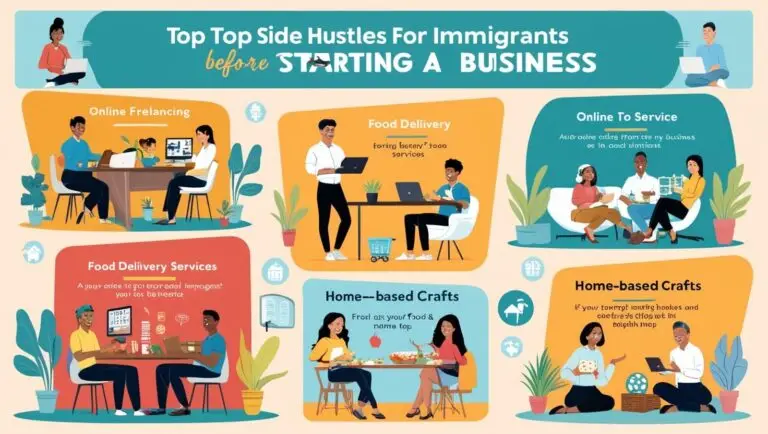Immigrant entrepreneurs have become a powerful force, driving innovation and contributing significantly to economies worldwide. However, for many immigrants, the dream of starting a business can feel daunting due to fear and uncertainty. From cultural barriers to navigating unfamiliar systems, the road to entrepreneurship often comes with unique challenges. This guide will empower you to face those fears, build confidence, and take actionable steps toward creating a successful business and a brighter future.
Understanding the Fear of Starting a Business as an Immigrant
Common Challenges Faced by Immigrants
- Cultural and Language Barriers: For many immigrants, adapting to a new culture and language can make it difficult to communicate effectively and connect with potential clients or business partners.
- Limited Access to Financial Resources: Traditional financing options, like bank loans, are often harder to access without a strong credit history or financial network.
- Unfamiliar Legal Systems: Navigating the legal and regulatory requirements for starting and running a business in a new country can feel overwhelming.
The Root of Fear
- Fear of Failure: The financial risks and potential setbacks of starting a business can discourage many immigrants from taking the first step.
- Fear of Discrimination: Prejudice or bias can create additional stress and uncertainty, especially in competitive markets.
- Family and Community Pressure: Immigrants often feel a responsibility to provide for their families, which can amplify the fear of making risky decisions.
Steps to Overcome the Fear and Build Confidence
Shift Your Mindset
Success begins with a positive mindset. Instead of focusing on obstacles, reframe them as opportunities for growth. Remember, every successful entrepreneur has faced challenges and failures before reaching their goals. Cultivating resilience and adaptability is key.
Build Knowledge and Skills
Educating yourself can help reduce uncertainty and boost your confidence. Consider these steps:
- Take courses or attend workshops on entrepreneurship, marketing, and finance.
- Connect with local business communities or immigrant entrepreneur networks for guidance and mentorship.
- Research your market and competitors to understand your niche better.
Start Small, Dream Big
Launching a business doesn’t have to be overwhelming. Start with a small, manageable venture, like a side hustle or part-time business. This approach allows you to test your ideas and gain experience without taking on too much risk. As your confidence grows, you can expand your operations.
Seek Support Systems
You don’t have to go through this journey alone. Build a support network by:
- Joining immigrant entrepreneur organizations or business incubators.
- Connecting with mentors who understand the unique challenges you face.
- Engaging with online communities where you can share experiences and get advice.
Accessing Resources and Navigating the System
Financial Tools for Immigrant Entrepreneurs
Accessing capital can feel intimidating, but there are resources tailored to immigrants, including:
- Microloans and grants designed for minority-owned businesses.
- Community development financial institutions (CDFIs) that offer loans with flexible terms.
- Crowdfunding platforms that allow you to raise funds directly from your network.
Legal and Regulatory Guidance
Understanding the legal aspects of starting a business is crucial. Seek help from:
- Pro bono legal services for immigrants and entrepreneurs.
- Local government offices or non-profits that provide business resources and licensing assistance.
Leveraging Community Programs
Communities often have programs to support immigrants in their entrepreneurial journey, such as:
- Business incubators that offer training, mentorship, and workspace.
- Local chambers of commerce or cultural associations that provide networking opportunities.
Inspiring Stories of Immigrant Entrepreneurs
Sometimes, all it takes is hearing about someone else’s success to spark inspiration. Consider the stories of entrepreneurs like:
- Hamdi Ulukaya, the founder of Chobani, who turned his small yogurt business into a billion-dollar brand despite starting as an immigrant with limited resources.
- Sophia Amoruso, who started a small eBay shop that eventually became the global fashion brand Nasty Gal.
These success stories show that fear is not a barrier but a stepping stone to achieving greatness. - Abbey Wemimo, a Nigerian-American entrepreneur, co-founded Esusu, a financial platform that helps low-income households build credit through rent payments. Growing up in Lagos and experiencing financial barriers firsthand inspired him to solve systemic challenges. His company is now valued at $1 billion
Building a Brighter Future Through Entrepreneurship
The Long-Term Benefits of Starting a Business
- Economic Independence: Running your own business can help you achieve financial stability and create opportunities for your family.
- Creating Jobs and Giving Back: Successful immigrant entrepreneurs often contribute to their communities by creating jobs and supporting local causes.
Transforming Fear into a Catalyst for Success
Rather than letting fear hold you back, use it as motivation to prepare thoroughly and think creatively. Fear can drive you to innovate and find unique solutions to challenges.
Fear is a natural part of any entrepreneurial journey, especially for immigrants who face unique obstacles. However, by shifting your mindset, seeking support, and utilizing the resources available to you, you can overcome these fears and build a thriving business. Remember, the first step is often the hardest—but it’s also the most important. Your brighter future begins today.
FAQs:
Q: What are some common mistakes immigrant entrepreneurs make and how can I avoid them?
A: Some common mistakes include underestimating market research, neglecting legal requirements, and failing to build a strong support network. Avoid these by doing thorough research, consulting experts, and building relationships with mentors and peers.
Q: How can I access funding for my business as an immigrant?
A: Look into microloans, grants, and immigrant-friendly lenders. Many organizations and programs exist specifically to support minority and immigrant entrepreneurs.
Q: What if I fail? How can I recover and try again?
A: Failure is a learning opportunity. Evaluate what went wrong, seek advice from mentors, and use the experience to make informed decisions for your next venture.






